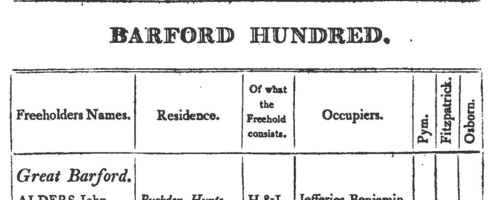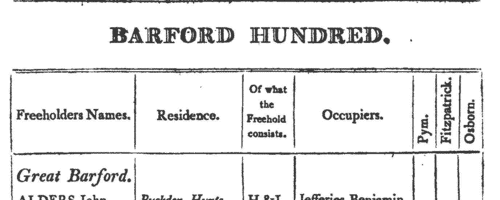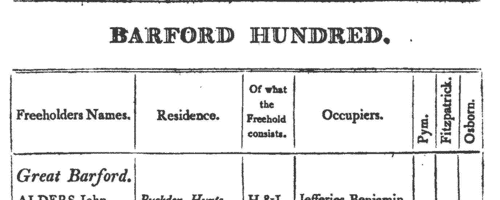Barcock Surname Ancestry ResultsOur indexes 1000-1999 include entries for the spelling 'barcock'. In the period you have requested, we have the following 26 records (displaying 11 to 20): Single Surname Subscription | | | Buying all 26 results of this search individually would cost £182.00. But you can have free access to all 26 records for a year, to view, to save and print, for £100. Save £82.00. More... |
These sample scans are from the original record. You will get scans of the full pages or articles where the surname you searched for has been found. Your web browser may prevent the sample windows from opening; in this case please change your browser settings to allow pop-up windows from this site.  Masters of Apprentices registered in Cambridgeshire
(1777) Masters of Apprentices registered in Cambridgeshire
(1777)
Apprenticeship indentures and clerks' articles were subject to a 6d or 12d per pound stamp duty: the registers of the payments usually give the master's trade, address, and occupation, and the apprentice's name, as well as details of the date and length of the apprenticeship. There are central registers for collections of the stamp duty in London, as well as returns from collectors in the provinces. These collectors generally received duty just from their own county, but sometimes from further afield. The indentures themselves can date from a year or two earlier than this return. (The sample entry shown on this scan is taken from a Bristol return. Each entry has two scans, the other being the facing page with the details of the indenture, length of service, and payment of duty.) IR 1/60BARCOCK. Cost: £8.00.  | Sample scan, click to enlarge

|  Masters of apprentices registered in Huntingdonshire
(1791) Masters of apprentices registered in Huntingdonshire
(1791)
Apprenticeship indentures and clerks' articles were subject to a 6d or 12d per pound stamp duty: the registers of the payments usually give the master's trade, address, and occupation, and the apprentice's name, as well as details of the date and length of the apprenticeship. There are central registers for collections of the stamp duty in London, as well as returns from collectors in the provinces. These collectors generally received duty just from their own county, but sometimes from further afield. The indentures themselves can date from a year or two earlier than this return. (The sample entry shown on this scan is taken from a Bristol return. Each entry has two scans, the other being the facing page with the details of the indenture, length of service, and payment of duty.) IR 1/66BARCOCK. Cost: £8.00.  | Sample scan, click to enlarge

|  Masters of apprentices registered at Bedford
(1794) Masters of apprentices registered at Bedford
(1794)
Apprenticeship indentures and clerks' articles were subject to a 6d or 12d per pound stamp duty: the registers of the payments usually give the master's trade, address, and occupation, and the apprentice's name, as well as details of the date and length of the apprenticeship. There are central registers for collections of the stamp duty in London, as well as returns from collectors in the provinces. These collectors generally received duty just from their own county, but sometimes from further afield. The indentures themselves can date from a year or two earlier than this return. (The sample entry shown on this scan is taken from a Bristol return. Each entry has two scans, the other being the facing page with the details of the indenture, length of service, and payment of duty.) IR 1/67BARCOCK. Cost: £8.00.  | Sample scan, click to enlarge

|  Masters of apprentices and clerks
(1796) Masters of apprentices and clerks
(1796)
Apprenticeship indentures and clerks' articles were subject to a 6d or 12d per pound stamp duty: the registers of the payments usually give the master's trade, address, and occupation, and the apprentice's name, as well as details of the date and length of the apprenticeship. 12 February to 31 December 1796. IR 1/37BARCOCK. Cost: £8.00.  | Sample scan, click to enlarge

|  Apprentices and clerks
(1802) Apprentices and clerks
(1802)
Apprenticeship indentures and clerks' articles were subject to a 6d or 12d per pound stamp duty: the registers of the payments usually give the master's trade, address, and occupation, and the apprentice's name, as well as details of the date and length of the apprenticeship. 3 June to 31 December 1802. IR 1/39BARCOCK. Cost: £8.00.  | Sample scan, click to enlarge

| Bedfordshire Freeholders and Occupiers: Eaton Socon
(1807)
A poll for two knights of the shire for the county of Bedford, was taken at Bedford from 11 to 22 May 1807, the candidates being Francis Pym esquire (1138 votes), the Rt Hon Richard Fitzpatrick (1084) and John Osborn esquire (1069). The poll book is arranged by hundred, and then by parish or township, giving the freeholders' names, residence, 'of what the freehold consists' (e. g. H. & L. for house and land), the occupier, and the vote cast. Non-voters are not listed: but at the end of each hundred there is a list of rejected votes, giving full name of voter, situation of the property, ground of rejection, and candidates for whom the votes were tendered.BARCOCK. Cost: £6.00.  | Sample scan, click to enlarge

| Bedfordshire Freeholders and Occupiers: Great Barford
(1807)
A poll for two knights of the shire for the county of Bedford, was taken at Bedford from 11 to 22 May 1807, the candidates being Francis Pym esquire (1138 votes), the Rt Hon Richard Fitzpatrick (1084) and John Osborn esquire (1069). The poll book is arranged by hundred, and then by parish or township, giving the freeholders' names, residence, 'of what the freehold consists' (e. g. H. & L. for house and land), the occupier, and the vote cast. Non-voters are not listed: but at the end of each hundred there is a list of rejected votes, giving full name of voter, situation of the property, ground of rejection, and candidates for whom the votes were tendered.BARCOCK. Cost: £6.00.  | Sample scan, click to enlarge

| Bedfordshire Freeholders and Occupiers: Milton Ernest
(1807)
A poll for two knights of the shire for the county of Bedford, was taken at Bedford from 11 to 22 May 1807, the candidates being Francis Pym esquire (1138 votes), the Rt Hon Richard Fitzpatrick (1084) and John Osborn esquire (1069). The poll book is arranged by hundred, and then by parish or township, giving the freeholders' names, residence, 'of what the freehold consists' (e. g. H. & L. for house and land), the occupier, and the vote cast. Non-voters are not listed: but at the end of each hundred there is a list of rejected votes, giving full name of voter, situation of the property, ground of rejection, and candidates for whom the votes were tendered.BARCOCK. Cost: £6.00.  | Sample scan, click to enlarge

| Tradesmen of Lynn in Norfolk
(1292-1836)
Lists of admissions of freemen of Lynn from the earliest surviving records to 1836 were published by the Norfolk and Norwich Archaeological Society in 1913. These lists were extracted from the tallage rolls of 1291 to 1306; the Red Register of Lynn from 1342 to 1395; from the assembly rolls for the reigns of Henry IV and V [1399 to 1422]; from the hall books from 1423; and from a list of freemen starting in 1443 in the Book of Oaths (but itself abstracted from entries in the hall books). Freedom of the borough, necessary to practise a trade there, could be obtained by birth (in which case the father's name and occupation are usually given); by apprenticeship to a freeman (the master's name and occupation being given); by gratuity; or by purchase. Both the freemen and the masters listed are indexed here. The main abbreviations used are: B., freedom taken up by right of birth; A., freedom taken up by right of apprenticeship; G., freedom granted by order of assembly (gratuity); and P., freedom acquired by purchase.BARCOCK. Cost: £4.00.  | Sample scan, click to enlarge

|  Persons of standing recommending London police recruits
(1843-1857) Persons of standing recommending London police recruits
(1843-1857)
The Metropolitan Police Register of Joiners (MEPO 4/334) lists policemen joining the force 1 January 1843 to 1 April 1857 (warrant numbers 19893 to 35804). The register is alphabetical, in so far as the recruits are listed chronologically grouped under first letter of surname. It gives Date of Appointment, Name, Number of Warrant, Cause of Removal from Force (resigned, dismissed, promoted or died), and Date of Removal. Although the register was closed for new entrants at the end of 1842, the details of removals were always recorded, some being twenty or more years later. Those recruits not formerly in the police, the army, or some government department, were required to provide (normally) at least two letters of recommendation from persons of standing, and details of these are entered on the facing pages. Where a recruit was only recently arrived in the metropolis, the names and addresses of the recommenders can be invaluable for tracing where he came from. Those recruits not formerly in the police, the army, or some government department, were required to provide (normally) at least two letters of recommendation from persons of standing, and details of these are entered on the facing pages: the names in these are indexed here (the police recruits are indexed separately and not included here). Recruits transferred from other forces or rejoining the force did not normally need recommendations - in the latter case, former warrant numbers are given - but some recommendations are from police inspectors, even other constables. Recruits coming from the army sometimes have general military certificates of good conduct, but most often have a letter from their former commanding officer; recruits recommended by government departments (most often the Home Office) similarly have letters from the head of department. But the great majority of the names and addresses in these pages are of respectable citizens having some sort of personal acquaintance with the recruit. Where more than two recommendations were provided, the clerk would only record one or two, with the words 'and others'. Tradesmen are sometimes identified as such by their occupations; there are some gentry. Although the bulk of these names are from London and the home counties, a scattering are from further afield throughout Britain and Ireland. BARCOCK. Cost: £8.00.  | Sample scan, click to enlarge

|
Research your ancestry, family history, genealogy and one-name study by direct access to original records and archives indexed by surname.
|













